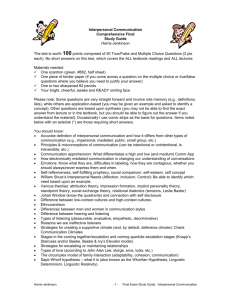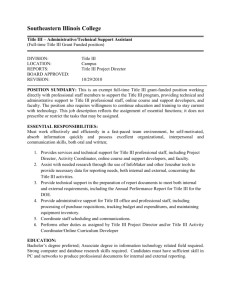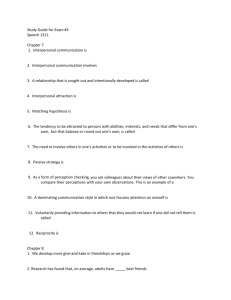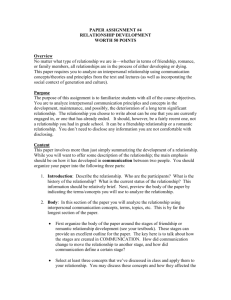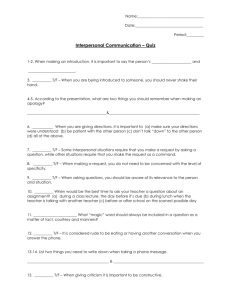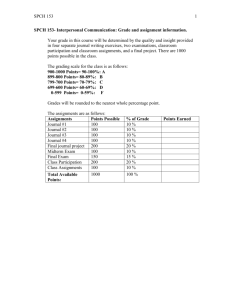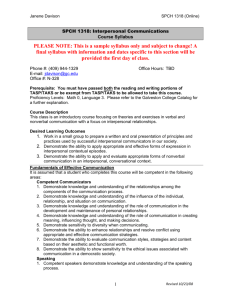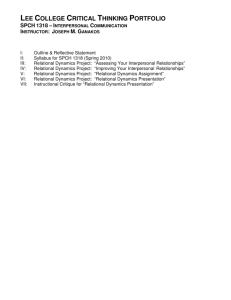Interpersonal Communication (SPCH 1318) Prerequisite/Co
advertisement
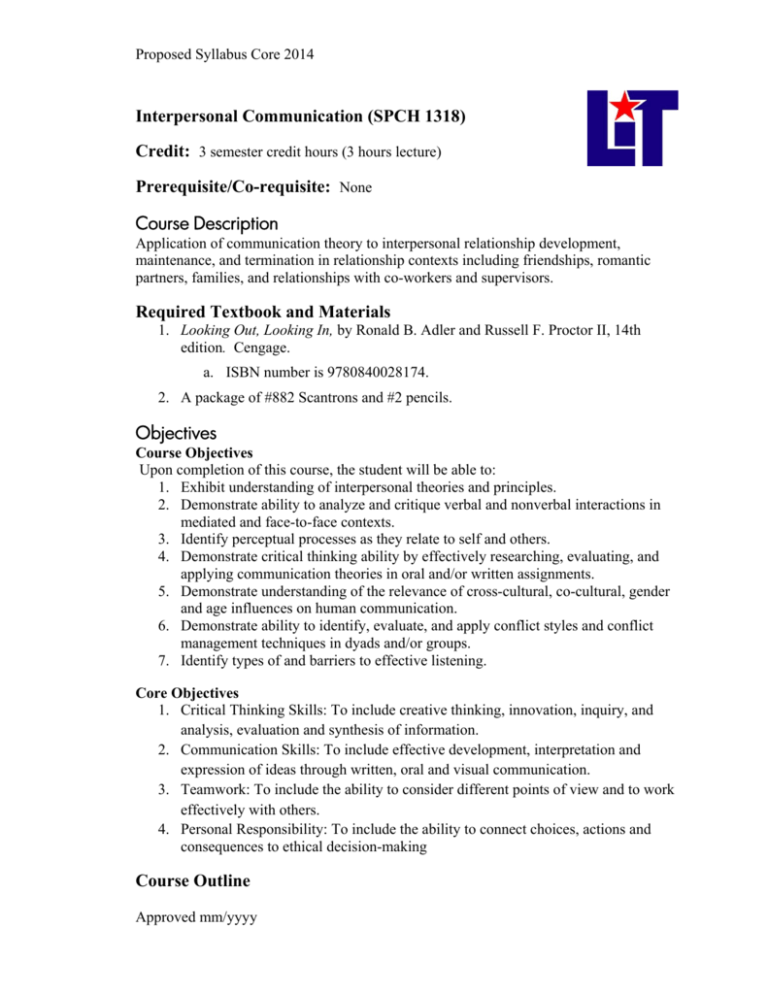
Proposed Syllabus Core 2014 Interpersonal Communication (SPCH 1318) Credit: 3 semester credit hours (3 hours lecture) Prerequisite/Co-requisite: None Course Description Application of communication theory to interpersonal relationship development, maintenance, and termination in relationship contexts including friendships, romantic partners, families, and relationships with co-workers and supervisors. Required Textbook and Materials 1. Looking Out, Looking In, by Ronald B. Adler and Russell F. Proctor II, 14th edition. Cengage. a. ISBN number is 9780840028174. 2. A package of #882 Scantrons and #2 pencils. Objectives Course Objectives Upon completion of this course, the student will be able to: 1. Exhibit understanding of interpersonal theories and principles. 2. Demonstrate ability to analyze and critique verbal and nonverbal interactions in mediated and face-to-face contexts. 3. Identify perceptual processes as they relate to self and others. 4. Demonstrate critical thinking ability by effectively researching, evaluating, and applying communication theories in oral and/or written assignments. 5. Demonstrate understanding of the relevance of cross-cultural, co-cultural, gender and age influences on human communication. 6. Demonstrate ability to identify, evaluate, and apply conflict styles and conflict management techniques in dyads and/or groups. 7. Identify types of and barriers to effective listening. Core Objectives 1. Critical Thinking Skills: To include creative thinking, innovation, inquiry, and analysis, evaluation and synthesis of information. 2. Communication Skills: To include effective development, interpretation and expression of ideas through written, oral and visual communication. 3. Teamwork: To include the ability to consider different points of view and to work effectively with others. 4. Personal Responsibility: To include the ability to connect choices, actions and consequences to ethical decision-making Course Outline Approved mm/yyyy Proposed Syllabus Core 2014 F. Nonverbal Communication: Messages beyond Words G. Listening: More Than Meets the Ear H. Communication and Relational Dynamics I. Communication and Relational Dynamics J. Communication in Close Relationships K. Improving Communication Climates L. Managing Interpersonal Conflicts A. A First Look at Interpersonal Communication B. Communication and Identity: Creating and Presenting the Self. C. Perception: What You See Is What You Get D. Emotions: Feeling, Thinking, and Communicating E. Language, Barrier and Bridge Grade Scale 90 – 100 80 – 89 70 – 79 60 – 69 0 – 59 A B C D F Course Evaluation Final grades will be calculated according to the following criteria: 1. Weekly Assignments 45% 2. Student Journal 30% 3. 2 Tests 10% 4. Group Presentation/Critique 15% Course Requirements Students are required to complete a journal of interpersonal experiences. Students are required to complete weekly assignments based on the lecture and discussion conducted during class. Students must complete 2 tests. Students are required to participate in the group presentation development and delivery. Failure to do so will result in an F in the course. Further directions for assignments will be provided in class. Course Policies 1. No food, drinks, or use of tobacco products in class. 2. Beepers, telephones, headphones, and any other electronic devices must be turned off while in class. 3. Do not bring children to class. 4. No late assignments will be accepted. 5. Students that miss a test are not allowed to make up the test. Students that miss a test will receive a grade of ‘0’. 6. Attendance Policy. Two absences are allowed. If a student is tardy to class or departs early three (3) times, it will be equal to one (1) absence. Each absence beyond two absences will result in a 5 point deduction from your final grade. Approved mm/yyyy SPCH 1318 Course Syllabus 7. If you wish to drop a course, the student is responsible for initiating and completing the drop process. If you stop coming to class and fail to drop the course, you will earn an ‘F’ in the course. 8. Additional class policies as defined by the individual course instructor. Disabilities Statement The Americans with Disabilities Act of 1992 and Section 504 of the Rehabilitation Act of 1973 are federal anti-discrimination statutes that provide comprehensive civil rights for persons with disabilities. Among other things, these statutes require that all students with documented disabilities be guaranteed a learning environment that provides for reasonable accommodations for their disabilities. If you believe you have a disability requiring an accommodation, please contact the Special Populations Coordinator at (409) 880-1737 or visit the office in Student Services, Cecil Beeson Building. Course Schedule Week of Topic Reference One A First Look at Interpersonal Communication Chapter One Two Communication and Identity: Creating and Presenting the Self Chapter Two Three Perception: What You See Is What You Get Chapter Three Four Emotions: Feeling, Thinking, and Communicating Chapter Four Five Language: Barrier and Bridge Chapter Five Six Nonverbal Communication: Messages beyond Words Chapter Six Seven Listening: More Than Meets the Ear Chapter Seven Eight Continue/ Test Nine Communication and Relational Dynamics Ten Continue Eleven Communication in Close Relationships Twelve Continue Thirteen Improving Communication Climates Fourteen Continue Fifteen Managing Interpersonal Conflicts Sixteen Review, Final Exam Given on the date and time specified by the official exam schedule 3 Chapter Eight Chapter 9 Chapter 10 Chapter 11 SPCH 1318 Course Syllabus Contact Information: Varies by instructor. 4
